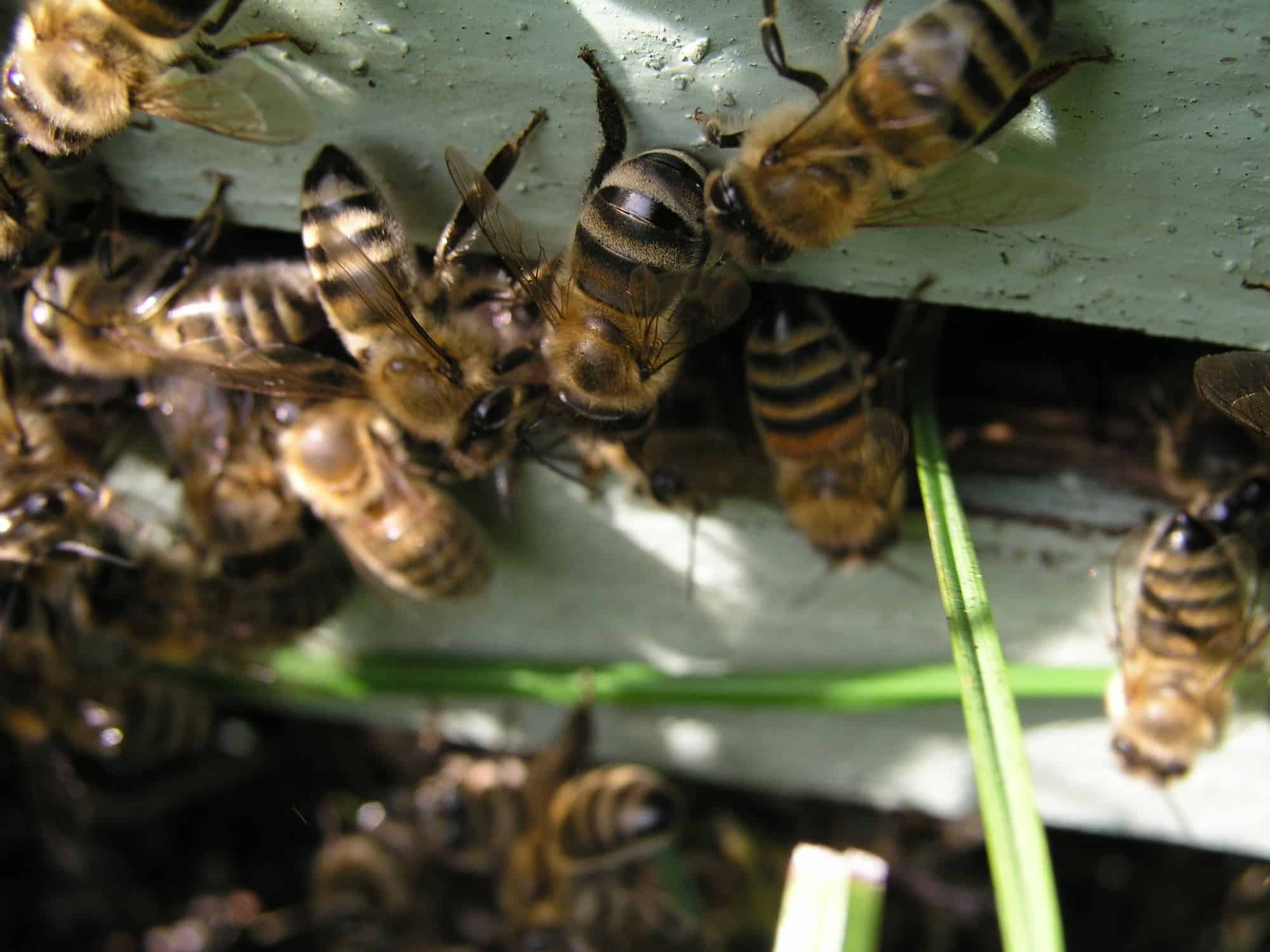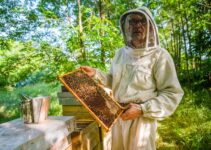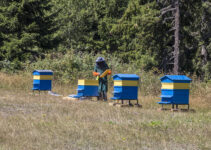In a bees’ wonderful and exciting world, various different types have specific roles to ensure the hive has some stability. Without bees having roles, the production process will be a mess, and it’ll be much less efficient, causing pollination and honey processes to be much slower. However, something that’s always amazed me is guard bees. But how long do guard bees live?
The average lifespan of a guard bee is 5 – 6 weeks during the spring and summer. But can live between 4-6 months over winter. However, it is the role of a guard bee to constantly put its life on the line for the greater good of the hive, so while they have the potential to live five months as a guard bee, they quite often sacrifice themselves much sooner.
As you can see, the life of a guard bee can vary massively, depending on the sacrifices they make. To understand more about what their job role is and why I recommend you read the below information:
What is a guard bee?
Just like the security guards you see keeping watch at your local hospital, guard bees carry the same duties for their colony. Their purpose: to keep the colony’s residents protected from any intruders.
There are various kinds of intruders that guard bees must defend against:
- Bees from neighboring colonies, especially robber bees.
- Different types of predatory insects, such as moths, yellow jackets, and ants.
- Small animals attempting to seek refuge inside a hive for warmth, like mice
- Medium-sized animals seek to eat bees or their honey, like raccoons, skunks, and some bird species.
- Large predators like bears on the prowl for a sweet treat.
- And, of course, we humans, who bees quite obviously assume we will steal their honey.
Like the security guard, a guard bee has a weapon to use if it needs to; it stings. But there is much more to a guard bees job than just stinging things. Like a human security guard, a guard bee must also be observant, differentiate between regular activity and real threats, and be able to call for assistance if needed.
Guard bees are not born as guard bees. They become them with age. Young bees within a colony make pretty poor guard bees; their stings are vastly underdeveloped, and they don’t understand the lay of the land yet. It is, in fact, the oldest bees that become the guard bees; their stings are the most potent and developed, and they have the least to lose from dying.
What do guard bees do?
Guard bees patrol at the entrance of the hive on their back legs with their front legs elevated. The guard bees examine every single bee coming into the beehive. The bees entering the hive let the guard bees look over them with their front legs. Guard bees can ascertain if a honey bee belongs to the hive by the bee’s smell, as each colony has a different odor. Any bee that belongs is given permission to enter. Nearly all drone bees are allowed to enter, as well as any bee loaded with pollen. No one passes up on free food, even if it’s coming from the wrong bee.
A standard healthy colony has anywhere between ten to twenty guard bees patrolling the opening of the hive. This number can alter depending on;
- The size of the entrance
- The season
- Pressure from nearby robbers
- Or presence of neighboring threats
Indeed, if a large predator like a bear strolls up to a hive, ten guard bees will not stand a chance of stopping an attack. When this happens, reinforcements are called for immediately by letting off an alarm pheromone. When an attack occurs, the whole colony is put on high alert. Every worker bee is temporarily promoted to guard bee, and every single one would sacrifice themselves to defend the hive.
So, what is the difference between a guard bee and a worker bee?
A worker bee is simply that – a bee that works. She’s always female, and depending on her age, will have many roles inside the colony.
While she is young, her role will be to nurture and feed the bee larvae as a nurse bee. She processes the incoming nectar into royal jelly and bee bread, feeds the larvae and queen, makes and caps honey, and does general tidying around the hive.
Older workers have many jobs and will more likely leave the hive to collect all the hive resources to survive. Regardless of age and job title, all worker bees have one job during winter and that’s to keep the queen warm.
The only definite difference between a guard bee and a worker bee is age and job title.
What do worker bees do?
Almost everything, they’re called worker bees because they will work themselves to death. Worker bees work on a hierarchy based on age.
- Mortuary bees (3-16 days) This job involves removing dead bees or larvae from the hive to reduce the likelihood of disease.
- Drone feeders (4-12 days) Baby drones aren’t able to feed themselves, so they need a worker bee to do it for them until they learn to do it themselves.
- Queen attendants (7-12 days) Attending the queen is a vital role, not only do these bees feed and groom her, but they inadvertently spread Queen Mandibular Pheromone all around the hive signaling to every bee in the colony that the queen is still viable.
- Pollen packers (12-18 days) Once foraging bees bring pollen back to the hive, the packers will take it and place it inside a honeycomb to use for feeding the brood.
- Honey sealers (12-35 days) These ladies take the honey, dry it out then cap it with the wax from their wax glands that all worker bees have.
- Honeycomb builders (12-35 days) Instead of using their own wax, they take the wax from other bees and use it to build honeycombs
- Fanners and water carriers (12-18 days) These workers travel around the hive fanning their wings and using water to keep everything cool during the hotter months
- Foragers (22-24 days) Foragers gather food for the colony and can travel in a 5-mile radius to collect propolis, nectar, and pollen.





